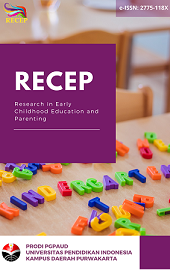MENGEKSPLORASI LITERASI ARTIFICIAL INTELLIGENCE DALAM PENDIDIKAN ANAK USIA DINI: SYSTEMATIC LITERATURE REVIEW
Abstract
Artificial Intelligence is currently a critical issue in early childhood education. However, most research on AI focuses on school education and rarely explores AI in early childhood education. This literature review aims to explore AI literacy in early childhood education. This review analyzed 10 articles related to AI in early childhood education. Although little research was found on this critical issue, the references used provide insight into the influence of AI education in early childhood development. AI literacy in early childhood education is done through coding and robotics learning to develop computational thinking, basic program skills and scientific thinking abilities in young children. The effectiveness of AI introduction is influenced by teacher competence.
Kecerdasan Buatan saat ini menjadi isu kritis dalam pendidikan anak usia dini. Namun, sebagian besar penelitian tentang AI berfokus pada pendidikan sekolah dan jarang mengeksplorasi AI pada pendidikan anak usia dini. Tinjauan literatur ini bertujuan untuk mengeksplorasi literasi AI dalam pendidikan anak usia dini. Ulasan ini menganalisis 10 artikel terkait AI dalam pendidikan anak usia dini. Meskipun hanya sedikit penelitian yang ditemukan mengenai isu kritis ini, referensi yang digunakan memberikan wawasan tentang pengaruh pendidikan AI pada perkembangan anak usia dini. Literasi AI pada pendidikan anak usia dini dilakukan melalui pembelajaran coding dan robotika untuk mengembangkan pemikiran komputasi, keterampilan program dasar, dan kemampuan berpikir ilmiah pada anak usia dini. Efektivitas pengenalan AI dipengaruhi oleh kompetensi guru.Keywords
Full Text:
HAL 91-96References
Angeli, C., & Valanides, N. (2020). Developing young children’s computational thinking with educational robotics: An interaction effect between gender and scaffolding strategy. Computers in Human Behavior, 105.
Bers, M. U., Flannery, L., Kazakoff, E. R., & Sullivan, A. (2014). Computational thinking and tinkering: Exploration of an early childhood robotics curriculum. Computers and Education, 72, 145–157.
Bers, M. U., González-González, C., & Armas-Torres, M. B. (2019). Coding as a playground: Promoting positive learning experiences in childhood classrooms. Computers and Education, 138, 130–145.
Lameras, P., & Arnab, S. (2022). Power to the teachers: an exploratory review on Artificial Intelligence in education. Information (Switzerland), 13(1), 1–38. https://doi.org/10.3390/info13010014
Misirli, A., & Komis, V. (2023). Computational thinking in early childhood education: The impact of programming a tangible robot on developing debugging knowledge. Early Childhood Research Quarterly, 65, 139–158.
Monett, D., Lewis, C. W. P., Thórisson, K. R., Bach, J., Baldassarre, G., Granato, G., Berkeley, I. S. N., Chollet, F., Crosby, M., Shevlin, H., Fox, J., Laird, J. E., Legg, S., Lindes, P., Mikolov, T., Rapaport, W. J., Rojas, R., Rosa, M., Stone, P., … Winfield, A. (2020). Special Issue “On defining artificial intelligence”—Commentaries and author’s response. Journal of Artificial General Intelligence, 11(2), 1–100.
Monteiro, A. F., Miranda-Pinto, M., José Osório, A., & Dorotea, N. (2021). Coding as literacy in preschool: A case study. Education Scienece, 11, 1–15.
Munawar, M., Suciati, S., Saputro, B. A., & Luthfy, P. A. (2023). Evaluasi program literasi digital di PAUD melalui robokids STEAM coding game. Jurnal Obsesi : Jurnal Pendidikan Anak Usia Dini, 7(2), 1836–1846.
Strawhacker, A., & Bers, M. U. (2019). What they learn when they learn coding: Investigating cognitive domains and computer programming knowledge in young children. Educational Technology Research and Development, 67(3), 541–575.
Strawhacker, A., Lee, M., & Bers, M. U. (2018). Teaching tools, teachers’ rules: Exploring the impact of teaching styles on young children’s programming knowledge in ScratchJr. International Journal of Technology and Design Education, 28(2), 347–376. https://doi.org/10.1007/s10798-017-9400-9
Su, J., Ng, D. T. K., & Chu, S. K. W. (2023). Artificial Intelligence (AI) literacy in early childhood education: The challenges and opportunities. In Computers and Education: Artificial Intelligence (Vol. 4, pp. 1–14). Elsevier B.V.
Su, J., & Yang, W. (2023). A systematic review of integrating computational thinking in early childhood education. Computers and Education Open, 4, 100122.
Su, J., & Zhong, Y. (2022). Artificial Intelligence (AI) in early childhood education: Curriculum design and future directions. Computers and Education: Artificial Intelligence, 3, 1–12.
Sugiana, Prasetyo, T. R., Pradini, S., & Irzalinda, V. (2023). Pemahaman guru PAUD tentang pembelajaran coding untuk anak usia dini. Aulad : Journal on Early Childhood , 6(2), 121–126.
Sullivan, A., & Bers, M. U. (2018). Dancing robots: integrating art, music, and robotics in Singapore’s early childhood centers. International Journal of Technology and Design Education, 28(2), 325–346.
Turan, S., & Aydoğdu, F. (2020). Effect of coding and robotic education on pre-school children’s skills of scientific process. Education and Information Technologies, 25(5), 4353–4363.
Yang, W. (2022). Artificial Intelligence education for young children: Why, what, and how in curriculum design and implementation. Computers and Education: Artificial Intelligence, 3, 2–7.
DOI: https://doi.org/10.17509/recep.v4i2.64654
Refbacks
- There are currently no refbacks.
Copyright (c) 2023 Research in Early Childhood Education and Parenting

This work is licensed under a Creative Commons Attribution-ShareAlike 4.0 International License.

This work is licensed under a Creative Commons Attribution 4.0 International License.



